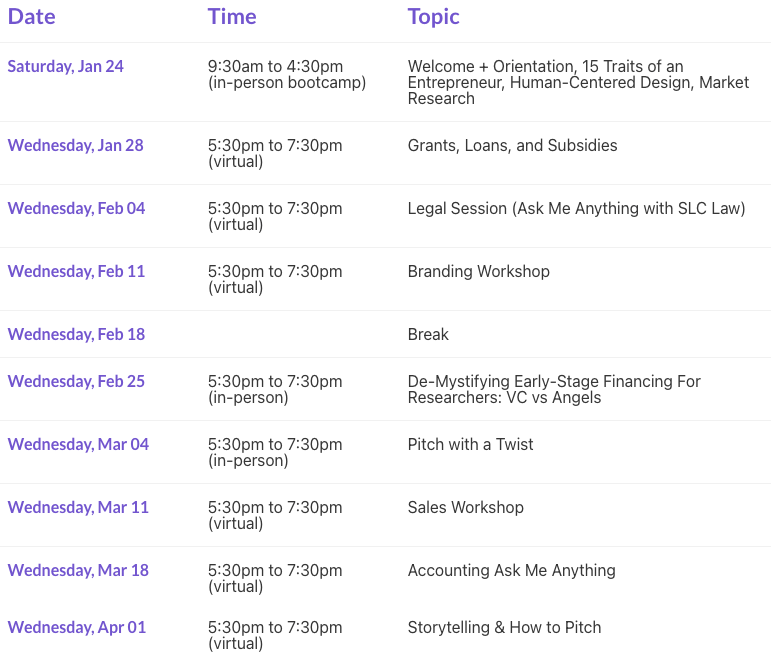It may sound obvious, but it’s important to remember that for startup founders, time is one of your most valuable resources, and effective time management is crucial for the success of your startup. With numerous responsibilities and tasks competing for attention, it’s essential to adopt strategies that optimize productivity and prioritize meaningful work. Here are some methods you can leverage to find exactly where your time management needs improvement, and then improve it!
Conducting a Time Audit
To gain a deeper understanding of how you currently allocate your time and identify areas for improvement, you can conduct a time audit. This involves tracking and analyzing how you spend your time over a defined period. Here’s one way to conduct a time audit effectively:
Set up the audit: Think about the duration of your audit and how long you will track how you use your time, whether it’s one week or one month. Choose a method for tracking your time, such as using a spreadsheet, time-tracking apps, or dedicated time-tracking tools. Ensure the method is convenient and easy to use consistently throughout the audit period – you don’t want to over-commit!
Record your activities: Throughout the audit period, diligently record your activities and the time spent on each task, categorizing them into different relevant groups. Capture both work-related and non-work-related activities to gain a better view of your time allocation.
Analyze and identify: Look for patterns and trends in how you allocate your time. Identify activities that consume significant portions of your day, as well as any time-wasting habits. Based on this analysis, find areas for improvement. Look for tasks that can be delegated, low-value tasks that can be minimized, and opportunities to streamline workflows. Then, set some goals on how to improve it!
Set Goals and Prioritize
Clear goals serve as the compass for effective time management. Learn how to define specific, measurable, achievable, relevant, and time-bound (SMART) goals that align with your startup’s vision. Break down these goals into actionable tasks and prioritize them based on their importance and urgency. By focusing on high-priority tasks, you can ensure that your time is dedicated to activities that contribute directly to your startup’s objectives.
Now that you have a list of SMART goals, prioritize ruthlessly. As a founder, you likely face a constant influx of urgent matters, making it essential to identify and focus on the most critical goals and activities. Creating a to-do list or leveraging project management tools can help establish priorities. The Eisenhower Matrix, which classifies tasks into four categories based on urgency and importance, is a valuable tool for effective prioritization.
Furthermore, understand when to delegate. Startup founders often find themselves wearing multiple hats, but attempting to do everything can lead to inefficiency. Delegation and outsourcing are vital to leverage expertise and optimize productivity. Identify tasks that can be effectively handled by others, such as administrative duties or specialized technical work. Build a reliable team or explore outsourcing options to lighten the workload, allowing yourself to focus on the most important goals.
Take Care of Yourself
Finally, remember to prioritize yourself. This may not sound like an important part of time management, but you need to remember that burnout will lead to a huge decline in productivity. As a founder, it’s important to recognize where your limits are and to not push them too frequently.
One way to protect your mental health is to learn when to say no. It’s likely that you often face numerous requests and demands from stakeholders, investors, and team members. Assess requests based on their alignment with core objectives and priorities. Politely decline requests and opportunities that don’t contribute to the immediate goals of the startup or push your limits too far. By setting boundaries and managing expectations, you can keep control of your time and health.
Another way is to reflect and reward yourself. Being a startup founder isn’t easy, and you deserve some rewards sometimes. Consider identifying milestones that, when reached, warrant a reward like your favourite meal or a day off. This will motivate you to achieve these goals, and let you recharge. Also, take time to reflect on your accomplishments and appreciate your progress. Building a positive mindset fuels motivation, enhancing time management practices.
Effective time management involves knowing exactly where your shortcomings are, then taking the appropriate step to remedy them. By conducting a time audit, setting goals, prioritizing appropriately, and making sure you take time to yourself, you’ll be well on your way to mastering time management.
Sources:
https://timelyapp.com/blog/time-audit
https://www.atlassian.com/blog/productivity/how-to-write-smart-goals
https://www.productplan.com/glossary/eisenhower-matrix/
https://online.hbs.edu/blog/post/how-to-delegate-effectively
https://www.shopify.com/ca/blog/120436229-time-management-tips
https://blog.salesflare.com/self-care-guide-startup-founders


